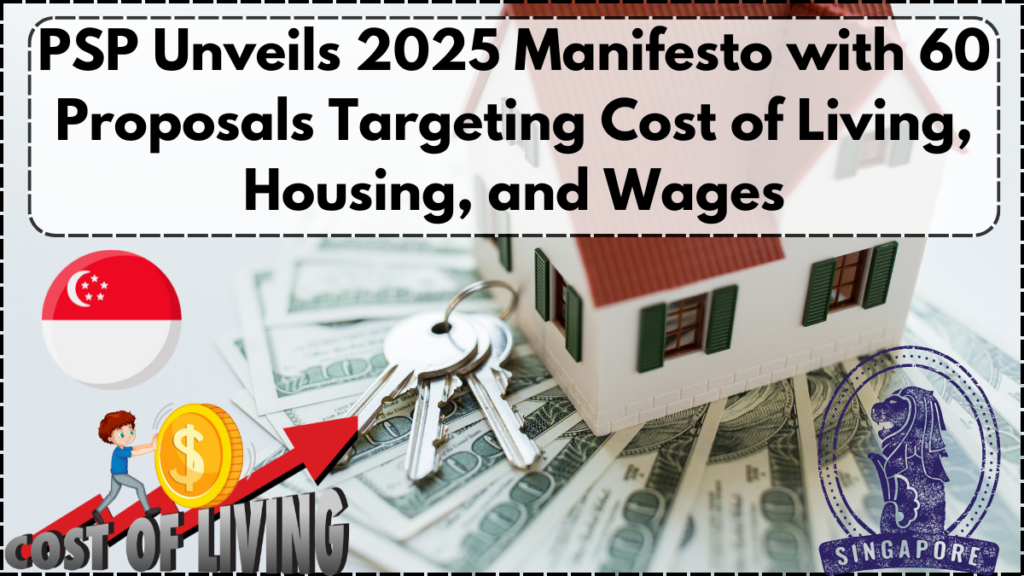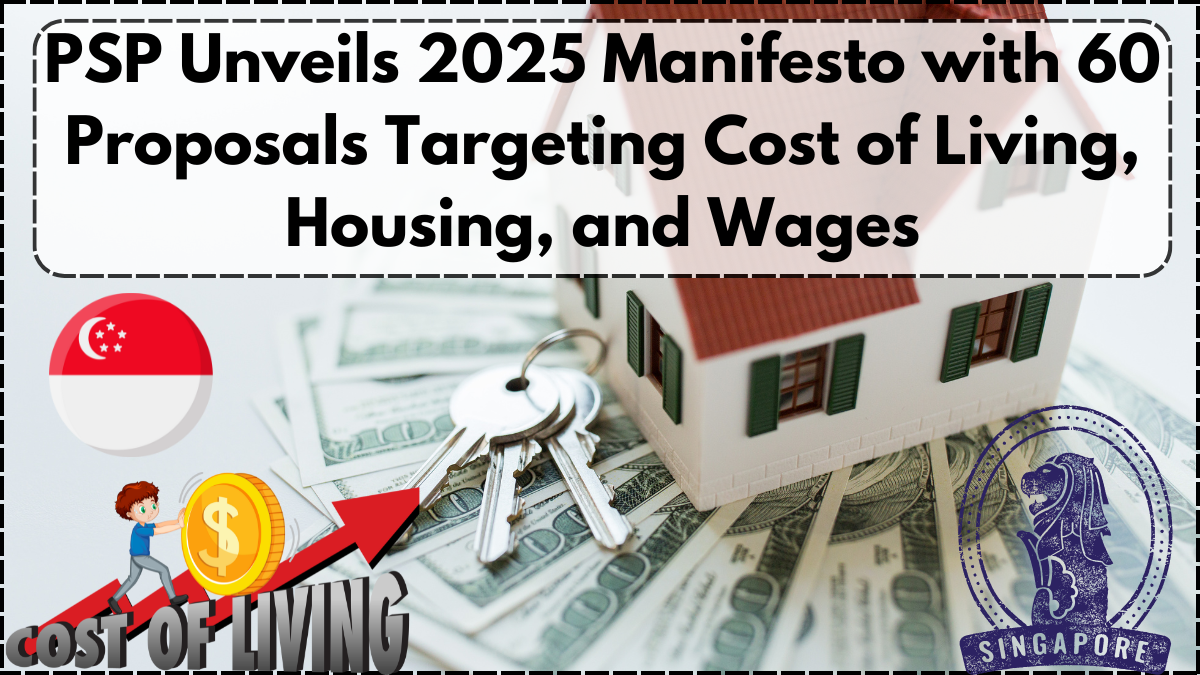On April 6, 2025, the Progress Singapore Party (PSP) officially launched its most comprehensive General Election manifesto to date at its headquarters in Bukit Timah. Titled “Progress for All,” the document introduces over 60 wide-ranging proposals aimed at addressing some of Singapore’s most pressing challenges, including the cost of living, housing affordability, employment competition, and social inequality.
Positioning itself as a constructive and solutions-oriented opposition party, PSP’s manifesto is designed not only to critique existing policies but to offer thoroughly researched and practical alternatives. This initiative represents nearly two years of collaborative work among party leaders, volunteers, and policy consultants.

A Policy Framework Built on Ten Key Pillars
PSP’s manifesto addresses ten vital policy areas, making it their most ambitious platform thus far:
- Cost of Living
- Housing Affordability
- Employment and Wages
- Education Reform
- Governance and Transparency
- Healthcare Accessibility
- Social Welfare and Safety Nets
- Environmental Sustainability
- Retirement Security
- Inclusive Economic Development
Each domain contains actionable policy items that aim to enhance citizens’ quality of life and ensure equitable progress.
Key Economic Reform Proposals
Among the most impactful economic policies proposed is the rollback of the Goods and Services Tax (GST) from 9% to 7%. PSP argues that the GST is regressive and unfairly burdens lower-income households. The party also recommends introducing GST exemptions for essential goods like rice, cooking oil, eggs, water, wheat flour, and infant formula. To prevent abuse, only basic-tier items (e.g., rice priced under S$2 per kilogram) would qualify for exemption.
To justify this fiscal shift, PSP highlights Singapore’s financial strength, citing national reserves exceeding S$1.2 trillion and investment returns of S$47 billion in FY2023.
Tackling Inflation through Rental and Land Cost Controls
PSP links rising inflation to unchecked rental increases in the commercial sector. They propose empowering the Fair Tenancy Industry Committee (FTIC) to issue annual rent increase benchmarks, modeled after the National Wages Council. This would help stabilize operational costs for SMEs and curb downstream price inflation.
Regarding hawker centers, PSP suggests scrapping the tender-based stall rental model. Instead, a fixed rent of S$500 or 3% of gross revenue (whichever is higher) would be imposed to maintain food affordability.
Affordable Homes Scheme: A New Public Housing Paradigm
A standout proposal is the Affordable Homes Scheme (AHS). Under this plan, buyers of new HDB flats would only pay for construction and a location-based premium. The land cost would be deferred and paid only if the property is sold on the resale market.
The party also proposes:
- Lowering the BTO eligibility age for singles from 35 to 28
- Launching Millennial Apartments for short-term rentals in CBDs and mature estates
- Shifting HDB’s supply model to build ahead of demand using demographic data
This policy aims to make home ownership more attainable for young Singaporeans and reduce long-term financial strain.
Labour Market Transformation: Fair Wages and Job Protection
To secure a dignified baseline for all workers, PSP proposes a Minimum Living Wage of S$2,250 per month (net S$1,800 after CPF). This would reduce reliance on welfare schemes like Workfare and GST rebates.
PSP’s employment proposals also include:
- A monthly Employment Pass (EP) levy of S$1,200
- Flat EP qualifying salary of S$10,000 across all sectors
- Employer diversity caps to avoid over-concentration of foreign hires
- A more stringent Fair Consideration Framework
Strengthening Social Support and Retirement Systems
In recognition of unpaid caregiving, PSP recommends a monthly allowance of S$1,250 (inclusive of CPF) for family caregivers of young children under seven. This would serve as an alternative to existing childcare subsidies.
Additional measures include:
- Doubling Silver Support payouts for seniors
- Consolidating over 60 welfare programs into fewer, more effective platforms
- Expanding MediSave usage for dental care, maternity services, and elective fertility treatments
- Fully subsidizing premiums for MediShield Life and CareShield Life
Education Overhaul: Nurturing Holistic Development
The PSP proposes an opt-out alternative to the Primary School Leaving Examination (PSLE), allowing students to follow a 10-year through-train programme based on continuous assessment.
Further recommendations:
- Smaller class sizes to cater to diverse learning needs
- A halt to automatic school mergers
- Two full-time counsellors per school
- Annual mental health surveys
- Mechanisms to track teacher well-being
The party also suggests reducing scholarships for international students and converting them into full-fee placements to increase educational resources for locals.
Highlight of PSP 2025 Manifesto Proposals
| Policy Area | Key Proposal | Expected Outcome |
|---|---|---|
| GST Reform | Reduce GST to 7%, exempt basic goods | Lower cost of living for lower-income households |
| Housing | Affordable Homes Scheme | Reduced mortgage burden, improved accessibility |
| Labour | Minimum Living Wage of S$2,250 | Economic dignity and reduced welfare dependence |
| Employment | EP levy and stricter diversity quotas | Level employment playing field for locals |
| Social Welfare | Caregiver allowance, consolidated schemes | Better support and clarity for beneficiaries |
| Education | PSLE opt-out, class size reduction | Holistic learning and mental well-being |
| Healthcare | Full subsidy for insurance premiums | Improved access to essential health services |
Conclusion
With the unveiling of the “Progress for All” manifesto, the Progress Singapore Party signals a definitive evolution into a policy-driven, constructive opposition. Their 2025 platform presents an extensive suite of reformative proposals, grounded in data and focused on building a fairer, more inclusive Singapore.
Whether voters perceive these ideas as aspirational or achievable will shape the political landscape in the upcoming May 2025 General Election. What’s clear is that PSP has elevated the quality and ambition of the policy debate—offering voters real alternatives.
FAQs
What is the main goal of PSP’s 2025 manifesto?
The manifesto aims to present a credible, people-first alternative to existing government policies by addressing key issues such as rising living costs, housing affordability, job security, and social inequality.
How does PSP plan to reduce the cost of living?
By proposing a rollback of the GST from 9% to 7% and introducing exemptions on essential goods. These measures are supported by Singapore’s strong fiscal position.
What changes are proposed in public housing?
The Affordable Homes Scheme allows buyers to defer land costs, making HDB flats more affordable. Additional measures include lower BTO eligibility age and short-term rental schemes for young adults.
Will PSP’s employment reforms affect foreign workers?
Yes. PSP suggests higher qualifying salaries, a monthly levy on EP holders, and diversity quotas to prioritize Singaporean workers.
How will education be improved?
The party advocates a PSLE opt-out pathway, smaller class sizes, better mental health support, and prioritizing resources for local students over international scholars.
For More Information Click Here
Pari is a passionate writer known for captivating stories that blend imagination and reality. Inspired by travel, history, and everyday moments, Pari crafts narratives that resonate deeply with readers.




